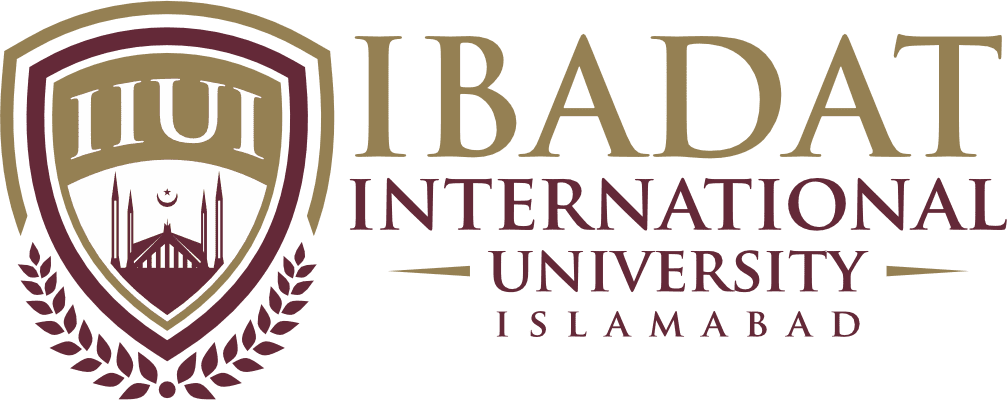FACULTY OF ALLIED HEALTH & BIOLOGICAL SCIENCES
Bachelor of Science in Food Science and Technology
Department
Diet & Nutritional Sciences
Level
Undergraduate
Semesters
08
Credit
136
INTRODUCTION
Welcome to the Department of Diet and Nutritional Sciences (DDNS), IBADAT International University, Islamabad. At present worldwide, the greatest challenge is to address the basic human needs for access to nutritious food, eliminate hunger and reduce poverty. The UN Sustainable Development Goals provides a powerful aspiration to eradicate these problems. The department aims for quality education and to prepare competent professionals to contribute in providing excellent services in both public and private sectors. We are pleased that you have chosen this department to expedite your passion for improving nutrition, health, wealth and prosperity of the community and contribute to national development.
The DDNS always value diversity in people, cultures, learning, and science. Collaboration with experts in multidisciplinary fields, within and outside of the University, is foremost and standard for students and faculty. We also value innovation and critical thinking in scholarly quests, transformative ideas and ambitions for the future. In this context, we have research collaboration agreement with the Nutrition Division, National Institute of Health, Islamabad, which is a premier research organization in the country and recognized worldwide.
We are committed to produce graduates to higher levels of human capabilities. The subjects of food, clinical nutrition, dietetics, public health; biochemical and molecular nutrition; nutrigenomics and food safety are included in the curriculum. The department possess a modern infrastructure with spacious classrooms, equipped with audio-visual aids and state of the art laboratories. The experienced and qualified faculty members are always committed for providing up-date knowledge and guidance to the students. Help them in designing and implementation of research projects and Internship plans to transform scientific knowledge into practical solutions for promoting sustainable human growth and economic development.
Ms. Madiha Iftikhar
- Program Duration
- Entry Requirements
Program Duration: 4 Year
Timing: Morning (Monday-Friday)
Location: 6.7 Km Japan Road, Sihala, Islamabad.
Recognized By: Higher Education Commission
Entry Requirements:
- Intermediate Science (Pre-Medical/Pre-Engineering) with 50% marks.
- Intermediate (Pre-Agriculture with minimum CGPA 2.20)
- A-Level or any other foreign equivalent qualification approved by IBCC having minimum 50% marks.
- Intermediate Science (Pre-Medical and Home Economics), A-Level (Biology mandatory) or equivalent with 50% marks.
University Entry Test / Interview
Course Code | Course Name | Pre-Requisite Course Code | Cr. Hrs |
Semester-I | |||
FST-6201 | Introduction to Food Science & Technology | – | 3(2+1) |
FST-6102 | Biochemistry | – | 3(2+1) |
FST-6101 | Functional English | – | 3(3+0) |
FST-6106 FST-6301 | Mathematics-I or Biology-I * | – | NC |
FST-6112 | Pakistan Studies | – | 2(2+0) |
FST-6111 | Seerat-Un-Nabi (P.B.U.H) | – | NC |
FST-6303 | General Microbiology | – | 3(2+1) |
FST-6113 | Introduction to Computer Science and Technology | – | 3(2+1) |
Credit Hours | 17(13+4) | ||
Semester-II | |||
FST-6107 FST-6302 | Mathematics-II or Biology-II * | – | NC |
FST-6110 | Islamic Studies/Ethics | – | 2(2+0) |
FST-6202 | Food Processing and Preservation | – | 3(2+1) |
FST-6223 | Food Product Development | – | 2(0+2) |
FST-6104 | Communication Skills | FST-6101 | 2(2+0) |
FST-6306 | Fundamentals of Human Nutrition | – | 3(3+0) |
FST-6305 | Marketing and Agribusiness | – | 3(3+0) |
FST-6304 | Introductory Bioinformatics | – | 2(1+1) |
Credit Hours | 17(13+4) | ||
Semester-III | |||
FST-6203 | Unit Operations in Food Processing | – | 3(3+0) |
FST-6109 | Introductory Statistics | – | 3(3+0) |
FST-6115 | Community Nutrition | – | 2(1+1) |
FST-6105 | Expository Writing | FST-6104 | 3(3+0) |
FST-6114 | Entrepreneurship | – | 3(3+0) |
FST-6209 | Food Plant Layout | – | 2(2+0) |
FST-6103 | Fundamentals of Sociology | – | 2(2+0) |
Credit Hours | 18(17+1) | ||
Semester-IV | |||
FST-6204 | Postharvest Technology | – | 3(2+1) |
FST-6205 | Food Biotechnology | – | 3(2+1) |
FST-6206 | Food Chemistry | – | 3(3+0) |
FST-6207 | Food Toxicology | – | 2(2+0) |
FST-6208 | Principles of Food Services | – | 3(3+0) |
FST-6108 | Research Methodology | – | 3(3+0) |
Credit Hours | 17(15+2) | ||
Semester-V | |||
FST-6210 | Food Process Engineering | – | 3(2+1) |
FST-6211 | Food Analysis | – | 3(1+2) |
FST-6212 | Fruits and Vegetables Processing | – | 3(2+1) |
FST-6213 | Dairy Technology | – | 3(2+1) |
FST-6214 | Cereal Technology | – | 3(2+1) |
FST-6215 | Sugar Technology | – | 3(2+1) |
Credit Hours | 18(11+7) | ||
Semester-VI | |||
FST-6216 | Food Microbiology | – | 3(2+1) |
FST-6217 | Meat Technology | – | 3(2+1) |
FST-6218 | Beverage Technology | – | 3(2+1) |
FST-6219 | Food Packaging | – | 3(2+1) |
FST-6220 | Food Laws and Regulations | – | 2(2+0) |
FST-6307 | Food Safety and Quality Management | – | 3(3+0) |
Credit Hours | 17(13+4) | ||
Semester-VII | |||
FST-6221 | Bakery Products Science &Technology | – | 2(1+1) |
FST-6222 | Technology of Fats and Oils | – | 3(2+1) |
FST-6229 | Food Additive | – | 3(3+0) |
FST-6230 | Functional Foods | – | 3(3+0) |
FST-6224 | Poultry and Egg Processing | – | 3(2+1) |
FST-6225 | Confectionery and Snack Foods | – | 3(2+1) |
Credit Hours | 17(13+4) | ||
Semester-VIII | |||
FST-6226 | Sensory Evaluation of Foods | – | 3(2+1) |
FST-6227 | Extrusion Technology | – | 3(2+1) |
FST-6228 | Recent Advances in Food Science and Technology | – | 3(3+0) |
FST-6401 | Internship | – | 3(0+3) |
FST-6501 | Project | – | 3(0+3) |
Credit Hours | 15(7+8) | ||
Total Credit Hours of BS Food Science & Technology (04 years): 136(102+34) | |||
MISSION
To develop a systematic and efficient understanding of latest knowledge, professional skills, principles of moral values and sense of responsibility in students focusing on human nutrition and dietetics to contribute in global health and well-being of the population through uplifting their nutritional status with intake of variety of foods, good dietary habits and healthy life style.
CAREER PROSPECTS
This degree program will enable the students to professionally excel in the field of Food Science and Technology through meeting today’s market requirements. The students after graduation will be able to demonstrate their expertise in multiple fields which include:
- Agricultural Provincial &Federal Government Departments
- Research Organizations
- Multinational and Local Food Industry
- Food Testing Laboratories
- Food Regulatory &Certification Organizations
- Food Authorities
- Colleges and Universities
- Small business development agencies
- Dairy Development Sector
- Hotel Industry
- Food Ingredient Suppliers
- School Health and Nutrition supervisors in basic health units in different districts of Punjab
- Researchers in research organizations
PROGRAM OBJECTIVES
The objective of this degree program to create undergraduates in Food Science and Technology to provide them with wide-ranging theoretical, practical, and methodological competencies. The educational objective of the Food Science and Technology program is to:
- Understand the basic principles of food science and technology:
A broad foundation in Food Science and Technology that stresses scientific reasoning and analytical problem solving with Food perspective.
- Develop a critical approach to research:
Developing the working knowledge of instrumentation and techniques related to Food and be able to use skills to design and conduct independent work.
- Apply ethical knowledge and team management skills:
An understanding of current ethical issues in Food Sciences and be able to apply ethical principles in industries/research laboratories. To provide a contemporary grounding in professional responsibility and job related skills in order to work in multidisciplinary teams.
- Acquire fundamental knowledge:
An ability to know, apply and critically analyze and evaluate concepts related to the Food Science and Technology.
- Apply problem-solving strategies.
An ability to develop problem-solving and critical thinking skills.
- Develop effective solutions:
Apply the fundamental knowledge in Food Science and Technology in undertaking problems identification, formulation and solution with critical thinking
- Conduct thorough investigations:
An ability to investigate complex problems in Food Science and Technology field by methodical way including literature survey, design and conduct of experiments, analysis and interpretation of experimental data, and synthesis of information to derive valid conclusions.
- Utilize modern tools effectively:
An ability to recognize and uses appropriate technologies, such as computer applications in Food Science and Technology laboratory methodologies.
- Apply ethical principles:
An ability to practice professional and ethical attitudes among society.
- Collaborate effectively in team environments:
An ability to acquire personal characteristics and leadership, management, and human relations skills appropriate to professional practice in careers related to Food Science and Technology
- Demonstrate proficiency in using communication tools:
Develop written and oral skills commensurate with the ability to summarize, evaluate, synthesize, and appropriately communicate scientific concepts to a variety of audiences.
- Demonstrate proficiency in project planning and execution:
An ability to demonstrate knowledge and understanding of technology management principles and apply these to one’s own work, as a member or leader in a team and to manage projects in multidisciplinary environments.
- Apply technological advancements responsibly:
An ability to demonstrate understanding of the societal, health and safety, issues and the consequent responsibilities relevant to Food Science and Technology.
PROGRAM LEARNING OUTCOMES
The students will be able to:
- Understand the basic principles of food science and technology, emphasizing scientific reasoning and analytical problem solving in a food context.
- Develop the working knowledge of instrumentation and techniques related to food science, using skills to design and conduct independent work.
- Demonstrate an understanding of current ethical issues in food sciences and apply ethical principles in industries and research laboratories, working effectively in multidisciplinary teams.
- Know, apply, and critically analyze concepts related to food science and technology.
- Develop problem-solving and critical thinking skills.
- Apply fundamental knowledge in food science and technology to identify, formulate, and solve problems with critical thinking.
- Investigate complex problems in the field of food science and technology methodically, including literature survey, experiment design and conduct, data analysis and interpretation, and synthesis of information to derive valid conclusions.
- Recognize and use appropriate technologies, such as computer applications, in food science and technology laboratory methodologies.
- Practice professional and ethical attitudes in society.
- Acquire personal characteristics and develop leadership, management, and human relations skills appropriate to professional practice in food science and technology careers.
- Develop written and oral communication skills to summarize, evaluate, synthesize, and communicate scientific concepts to various audiences.
- Demonstrate knowledge and understanding of technology management principles, apply them in one’s work, and manage projects in multidisciplinary environments.
13. Understand societal, health, and safety issues and the responsibilities relevant to food science and technology.

